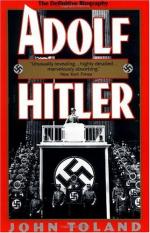|
This section contains 797 words (approx. 3 pages at 300 words per page) |

|
Hitler's Rise to Power
Summary: Adolf Hitler took advantage of the political and economic turmoil of the 1930s to establish his dictatorship, despite never having a majority of public approval or votes. Political coalitions, economic crisis, hatred of democracy and proportional representation severely weakened the German state, because they all prevented the country from forming a strong democracy that could have withstood an attempt to establish a dictatorship.
Before Hitler rose to supreme power in Germany in the 1930's, there were many attempts at setting up a stable, democratic government. Hitler was in charge of the National Socialist Party (Nazis), who grew from a membership of less than 30 to millions in the span of only 10 years. In all this time though Hitler and his Nazis never had a majority of the public's approval or votes. For that matter though, no parties held a decisive majority in the Reichstag (the legislature). Unlike the two party system in the US, which allows for one group to receive the majority of the vote, by 1930, Germany had more than 28 parties competing for election (and actually winning some seats).
The government in Germany was set up with an elected President (Hindenburg), and a Chancellor who is elected by and responsive to the Reichstag. The real power lies in the Chancellor, whereas...
|
This section contains 797 words (approx. 3 pages at 300 words per page) |

|


